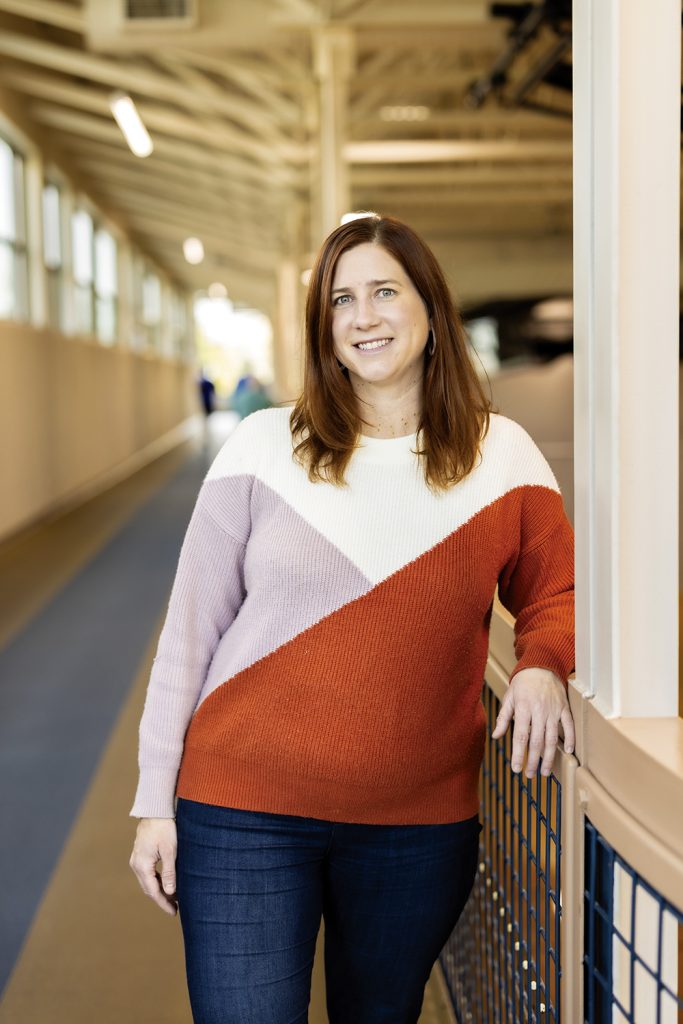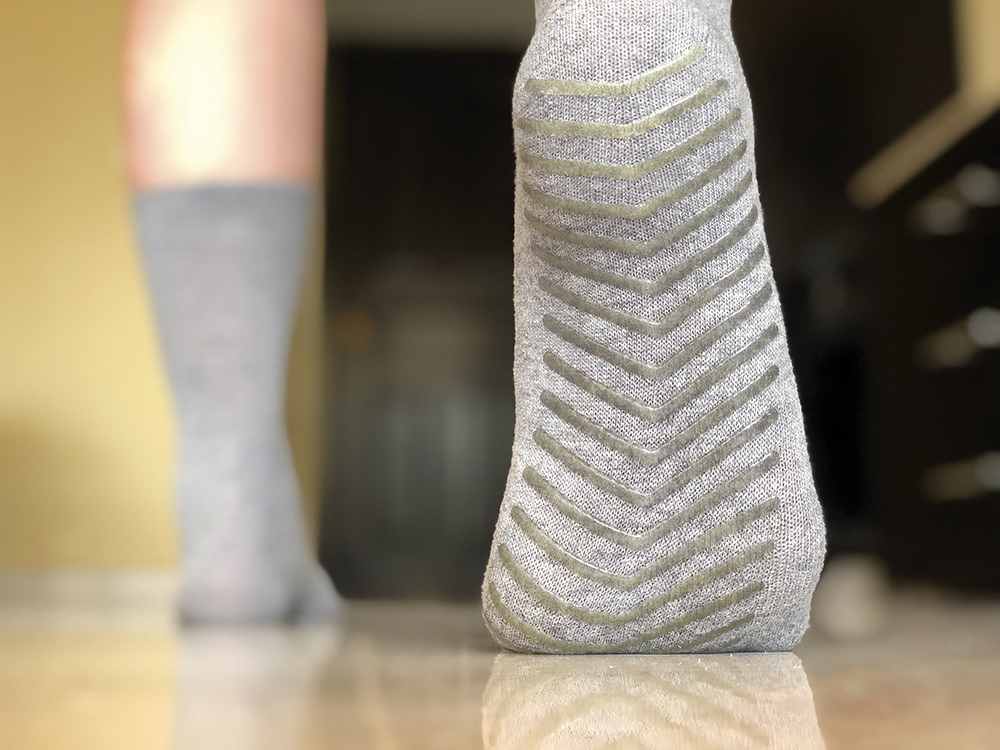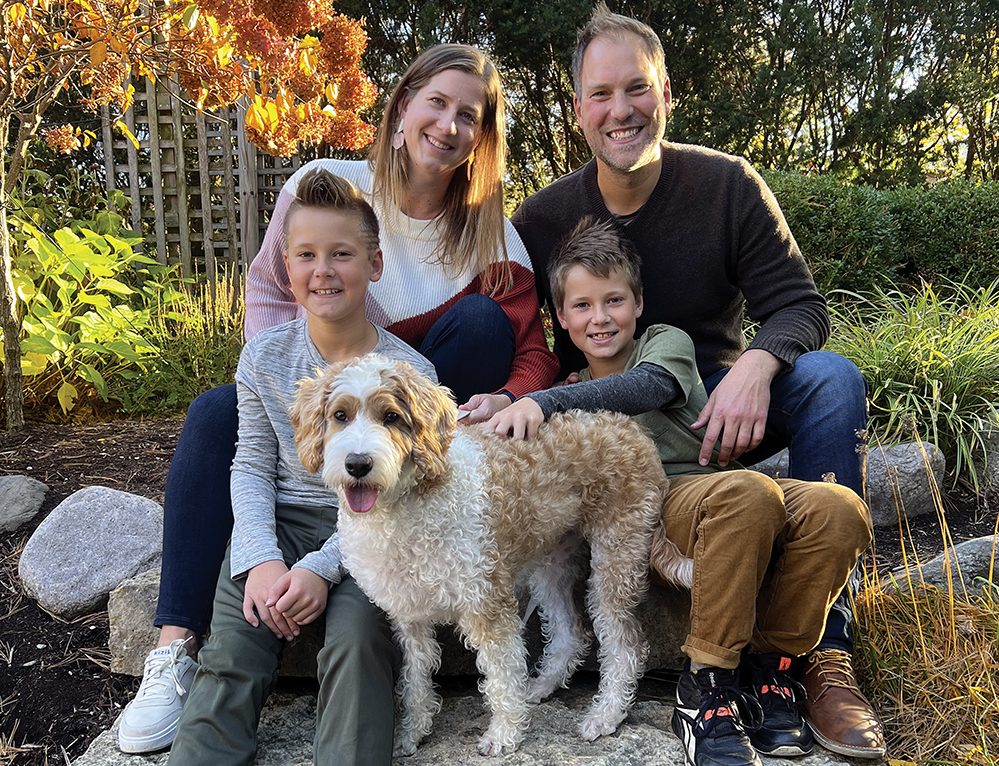Gripping Joy: Alison Miles jumped into socks one foot at a time

By Maureen Callahan
About five years ago, Downers Grove resident Alison Miles began feeling tired and weaker than usual. Simple tasks such as lifting a laundry basket had become difficult. Shortly thereafter, she was diagnosed with Pompe disease – a relatively rare genetic disorder that causes progressive muscle weakness. The body is unable to break down glycogen in the cells. Over time, muscles waste away.
A diagnosis of Pompe disease used to carry little hope. About a decade and a half ago, a treatment to slow the progression was discovered, and new drugs have come to market, for which Alison has participated in clinical trials.

Gripjoy socks have smaller grip pads than comparable brands, which makes them more comfortable
It’s much easier to slip and fall with this condition. Socks with grips on the bottom – designed to create traction between the sock and floor – are necessary. While grip socks already existed, they were bulky and difficult to fit in a regular shoe. Also, the grips felt too pronounced to Alison, which made them uncomfortable.
Shortly after the diagnosis, Alison and her husband, Chad, flew to North Carolina to attend Duke University’s annual Pompe research conference. While waiting to catch the flight home, they found themselves in an airport restaurant with a few hours to kill. As they contemplated the mountain of information presented at the meetings, Alison had a realization.
“I just thought, ‘Okay, this is my life now,’” she remembered. “An ugly diagnosis that will progress, with a lifetime ahead of ugly socks that look like I just left the hospital. At that moment, Chad looked at me and said, ‘Why don’t we design our own socks and start a business?’”
Before they boarded their flight that afternoon, they came up with a sock design that contained the all-important grips. But these were flatter and less pronounced than what were on the market. “I wanted a sock that wouldn’t be noticeable if I took my shoes off at someone else’s house,” said Alison.
On the same cocktail napkin that held their sock design, they scratched out possible company names. The pair landed on Gripjoy. It accurately described their sentiments. “To us, it made sense,” said Alison. “Even though there’s this diagnosis we’re now going to deal with, we can still grab joy from life.”
“Everyone has something they’re trying to get through,” she knows. “You can still decide to find joy.”
Gripjoy went from an airport cocktail napkin idea to a company in just six months. Alison’s former career in international trade and product management, paired with Chad’s financial and analytical background, made the perfect combination of skills to bring the project to life.
Alison posted Gripjoy’s launch on Facebook. It was also the first time she spoke about her diagnosis. She was pleasantly amazed at the outpouring of support and encouragement. Any uncertainties about the business quickly vanished as the inventory rapidly sold. “I was a little surprised, not only at how many people needed socks but also that they were willing to buy them from me!” she laughed.
“I started this business for a logical reason. I needed no-slip socks and couldn’t find any I liked.”
– Alison Miles, on the practicality of her company, Gripjoy

Alison and Chad Miles, with sons Hunter and Will, and dog Montana
Their first product – a three-pack of socks in shades of grey, available in two sizes, sold out quickly. Not long after, a shipment arrived that would no longer fit in their garage – their original storage space. Initially, they rented a warehouse space in downtown Downers Grove, where they fulfilled customer orders themselves. As the endeavor expanded, they rapidly outgrew that space, too.
These days, the business is run from their Downers Grove home, with the actual socks and order fulfillment processed from a warehouse in Utah. Gripjoy has earned a place of note in a crowded market.
So far, so good.
But that’s not to say there haven’t been moments of doubt along the way, especially in the beginning. Alison recalled when the first shipment of socks arrived on their driveway. “I remember wondering if this was crazy and if we would end up with enough socks for three lifetimes,” she laughed. Although there has been much success, there have been leaner years than others. It’s all part of running a business.
And the hurdles have not been without purpose. The couple hopes their 10-year-old twins, Hunter and Will, will one day understand the significance of Gripjoy. “We hope our sons will be willing to try new things and take calculated risks,” said Alison.
The business is not only a partnership but also a family affair. Hunter and Will have weighed in on design decisions. They also accompany Alison on outreach projects to DuPagePads and Burgess Square Healthcare & Rehab Center, where socks are always needed.
“We see this as family first entrepreneurship,” said Alison. Occasionally, Alison and Chad will leave an opportunity on the table if they feel it will encroach on family time. “We want to grow the business but also realize this time with our children is precious and want to be there to fully support them.”
Now five years in, Gripjoy offers socks for adults and children in eight different styles with 15-20 colors for the most popular variations.
The outstanding quality Gripjoy holds over similar products is smaller, less noticeable grip pads on attractive socks with fun colors and designs. They fit comfortably inside athletic and casual shoes.
And they look like any other sock. That vision has been realized. These breathable socks contain responsibly sourced cotton and are cozy while still offering the perfect fit. Between individual and commercial accounts in the United States and Canada, such as hospitals, yoga studios, and maternity shops, Gripjoy has over 100,000 customers.
“It’s shocking how many people need this type of sock,” said Alison. She is mindful of the vision that brought about the business. 10% of Gripjoy’s annual sales go directly to various organizations that research Pompe and other muscular degenerative conditions.
“Many people have reached out to me to compliment the socks,” said Alison. “One woman even claims they have changed her life!” The company has helped Alison and her family deal with Pompe disease by ushering in a positive purpose to a difficult diagnosis. “Gripjoy helps me cope with Pompe. It has turned my diagnosis into something productive,” she smiled.
To learn more about Gripjoy, visit gripjoy.com.

Gripjoy socks have smaller grip pads than comparable brands, which makes them more comfortable
